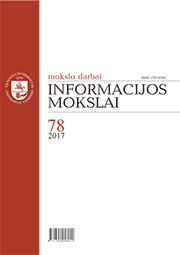Integruota rinkodaros komunikacija: edukacinių renginių rėmimo virtualių platformų vertinimas
Integrated Marketing Communication: an Evaluation of Educational Events and the Promotion of Virtual Platforms
Author(s): Liudmila Lobanova, Arūnas RakauskasSubject(s): Education and training, Theory of Communication, Marketing / Advertising, ICT Information and Communications Technologies
Published by: Vilniaus Universiteto Leidykla
Keywords: integrated marketing communication; marketing channels; educational events; virtual support platforms;
Summary/Abstract: The improvement of marketing communication channels become the actual objective in developing educational events activities. The inefficient use of communication tools in promotion of educational events does not sufficiently encourage consumers to take interest in such events. Marketing communication experiences gained in promoting various events can be useful in improving the channels for promoting educational events. This article summarizes the experience gained by organizers of educational events through integrated empirical research, the results of which are based on the perspectives and ways of using such integrated marketing communication channels as specialized platforms for the promotion and promotion of educational events that allow expanding the possibilities of traditional communication tools. Based on the theoretical analysis and empirical research findings, the article summarizes the experience gained in the field of event promotion and publicity measures. Analyzing the peculiarities for various channels of events promotion, the advantages of using virtual platforms of educational events promotion and opportunities for improving integrated marketing communication tools are revealed. The integrated marketing communication concept application for educational event publicity is a viable educational events marketing development tool. The educational events format is not strictly regulated, and educational events have many different features shapes, although they correspond to education, training and educational concepts. The larger scale of the event organizers lies in that they mostly use the greater part of the funds in targeted paid advertising in order to attract the target audience of consumers. In smaller event organization processes, the greater emphasis is being given on online advertising. Therefore, the application of integrated marketing communication is becoming an important tool for supporting small-scale publicity events. The most commonly used integrated marketing communication tools are as follows: Site search engine optimization (SEO and SEM), the Google Adwords advertising tool, advertising panels/banners. These measures are not used by all of the business entities, but they help to reach the target audience with sufficient accuracy. Social networking is the most used tool for event organizers to publicize events, attract various groups of interested persons, to communicate with customers so as to get feedback. The evaluation of each site’s social benefits specifics can help to make efficient use of integrated marketing communication purposes: a) Facebook allows you to quickly create an event advertisement, show how effective are the heavy advertising options and how quickly the target audience is being reached. Paid advertising of the event function allows you to filter target audiences based on specific criteria and to promote your event precisely to those audiences; b) The LinkedIn network offers a number of promotional tools, which allows for sharing of information about organized events, communicating with certain groups and searching for partners. Social networks are integrated in a virtual environment, where you can choose the advertising strategies and where you can also manage, monitor and analyze them. Event promotion and ticketing platforms are becoming an increasingly popular form used for event publicity, since the type of operating principles of these sites comply with the complex elements of promotion. Event promotion platforms are the main features of events publicity, ticket sales and registration for the events execution. These sites are perfectly tailored as publicizing events and event notices providing key information. Analytical tools allow one to analyze customer flows, because this platform is linked with social networks; therefore, these platforms can be used to share publicized events on social networks and thus expand the scope of the audience. Virtual platforms are superior in comparison with the social networks, as they are integrated with additional functions, such as the concept of the event, budget, time limits, transfer calls and so on. The event publicity virtual platform is designed to attract the target audience, so it can become a viable integrated marketing communication tool, ideal for educational events to inform visitors and to attract them. The biggest drawback is that despite the fact that the virtual platform is fully optimized, their popularity in Lithuania is not high, and event organizers are just starting to use these event publishing processes.
Journal: Informacijos mokslai
- Issue Year: 2017
- Issue No: 78
- Page Range: 83-104
- Page Count: 22
- Language: Lithuanian

